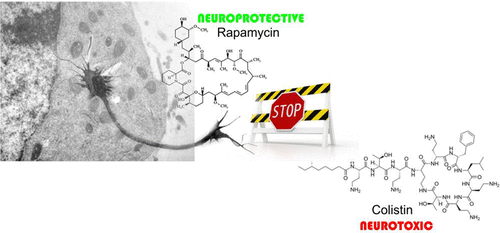当前位置:
X-MOL 学术
›
ACS Chem. Neurosci.
›
论文详情
Our official English website, www.x-mol.net, welcomes your feedback! (Note: you will need to create a separate account there.)
Rapamycin Confers Neuroprotection against Colistin-Induced Oxidative Stress, Mitochondria Dysfunction, and Apoptosis through the Activation of Autophagy and mTOR/Akt/CREB Signaling Pathways
ACS Chemical Neuroscience ( IF 5 ) Pub Date : 2017-12-19 00:00:00 , DOI: 10.1021/acschemneuro.7b00323 Chongshan Dai 1 , Giuseppe D. Ciccotosto 2 , Roberto Cappai 2 , Yang Wang 1 , Shusheng Tang 1 , Daniel Hoyer 3, 4, 5 , Elena K. Schneider 6 , Tony Velkov 6 , Xilong Xiao 1
ACS Chemical Neuroscience ( IF 5 ) Pub Date : 2017-12-19 00:00:00 , DOI: 10.1021/acschemneuro.7b00323 Chongshan Dai 1 , Giuseppe D. Ciccotosto 2 , Roberto Cappai 2 , Yang Wang 1 , Shusheng Tang 1 , Daniel Hoyer 3, 4, 5 , Elena K. Schneider 6 , Tony Velkov 6 , Xilong Xiao 1
Affiliation

|
Our previous studies showed that colistin-induced neurotoxicity involves apoptosis and oxidative damage. The present study demonstrates a neuroprotective effect of rapamycin against colistin-induced neurotoxicity in vitro and in vivo. In a mouse model, colistin treatment (18 mg/kg/d; 14 days) produced marked neuronal mitochondria damage in the cerebral cortex and increased activation of caspase-9 and -3. Rapamycin cotreatment (2.5 mg/kg/d) effectively reduced this neurotoxic effect. In an in vitro mouse neuroblastoma-2a (N2a) cell culture model, rapamycin pretreatment (500 nM) reduced colistin (200 μM) induced cell death from ∼50% to 72%. Moreover, rapamycin showed a marked neuroprotective effect in the N2a cells by decreasing intracellular reactive oxygen species (ROS) production and by up-regulating the activities of the anti-ROS enzymes superoxide dismutase and catalase and recovering glutathione (GSH) levels to normal. Moreover, rapamycin pretreatment protected against colistin-induced mitochondrial dysfunction, caspase activation, and subsequent apoptosis by up-regulating autophagy and activating the Akt/CREB, NGF, and Nrf2 pathways, while inhibiting p53 signaling. Taken together, this is the first study to demonstrate that rapamycin protects against colistin-induced neurotoxicity by activating autophagy, inhibiting oxidative stress, mitochondria dysfunction, and apoptosis. Our data highlight that regulating autophagy to rescue neurons from apoptosis may become a new targeted therapy to relieve the adverse neurotoxic effects associated with colistin therapy.
中文翻译:

雷帕霉素通过自噬和mTOR / Akt / CREB信号通路的激活,赋予神经保护作用,以抵抗colistin诱导的氧化应激,线粒体功能障碍和细胞凋亡。
我们以前的研究表明,大肠菌素诱导的神经毒性涉及细胞凋亡和氧化损伤。本研究证明雷帕霉素在体外和体内对大肠菌素诱导的神经毒性具有神经保护作用。在小鼠模型中,粘菌素治疗(18 mg / kg / d; 14天)在大脑皮层中产生明显的神经元线粒体损伤,并增强了caspase-9和-3的活化。雷帕霉素共治疗(2.5 mg / kg / d)可有效降低这种神经毒性作用。在体外在小鼠神经母细胞瘤2a(N2a)细胞培养模型中,雷帕霉素预处理(500 nM)将大肠菌素(200μM)诱导的细胞死亡从约50%降低至72%。此外,雷帕霉素可通过减少细胞内活性氧(ROS)的产生并通过上调抗ROS酶超氧化物歧化酶和过氧化氢酶的活性并将谷胱甘肽(GSH)水平恢复至正常水平而在N2a细胞中显示出明显的神经保护作用。此外,雷帕霉素预处理可通过上调自噬并激活Akt / CREB,NGF和Nrf2途径,同时抑制p53信号传导,从而防止粘菌素诱导的线粒体功能障碍,胱天蛋白酶激活以及随后的细胞凋亡。综上所述,这是第一项证明雷帕霉素可通过激活自噬,抑制氧化应激来保护大肠粘菌素诱导的神经毒性的研究,线粒体功能障碍和凋亡。我们的数据强调,调节自噬以使神经元免于凋亡可能成为减轻与大肠菌素疗法相关的不良神经毒性作用的新型靶向疗法。
更新日期:2017-12-19
中文翻译:

雷帕霉素通过自噬和mTOR / Akt / CREB信号通路的激活,赋予神经保护作用,以抵抗colistin诱导的氧化应激,线粒体功能障碍和细胞凋亡。
我们以前的研究表明,大肠菌素诱导的神经毒性涉及细胞凋亡和氧化损伤。本研究证明雷帕霉素在体外和体内对大肠菌素诱导的神经毒性具有神经保护作用。在小鼠模型中,粘菌素治疗(18 mg / kg / d; 14天)在大脑皮层中产生明显的神经元线粒体损伤,并增强了caspase-9和-3的活化。雷帕霉素共治疗(2.5 mg / kg / d)可有效降低这种神经毒性作用。在体外在小鼠神经母细胞瘤2a(N2a)细胞培养模型中,雷帕霉素预处理(500 nM)将大肠菌素(200μM)诱导的细胞死亡从约50%降低至72%。此外,雷帕霉素可通过减少细胞内活性氧(ROS)的产生并通过上调抗ROS酶超氧化物歧化酶和过氧化氢酶的活性并将谷胱甘肽(GSH)水平恢复至正常水平而在N2a细胞中显示出明显的神经保护作用。此外,雷帕霉素预处理可通过上调自噬并激活Akt / CREB,NGF和Nrf2途径,同时抑制p53信号传导,从而防止粘菌素诱导的线粒体功能障碍,胱天蛋白酶激活以及随后的细胞凋亡。综上所述,这是第一项证明雷帕霉素可通过激活自噬,抑制氧化应激来保护大肠粘菌素诱导的神经毒性的研究,线粒体功能障碍和凋亡。我们的数据强调,调节自噬以使神经元免于凋亡可能成为减轻与大肠菌素疗法相关的不良神经毒性作用的新型靶向疗法。



























 京公网安备 11010802027423号
京公网安备 11010802027423号